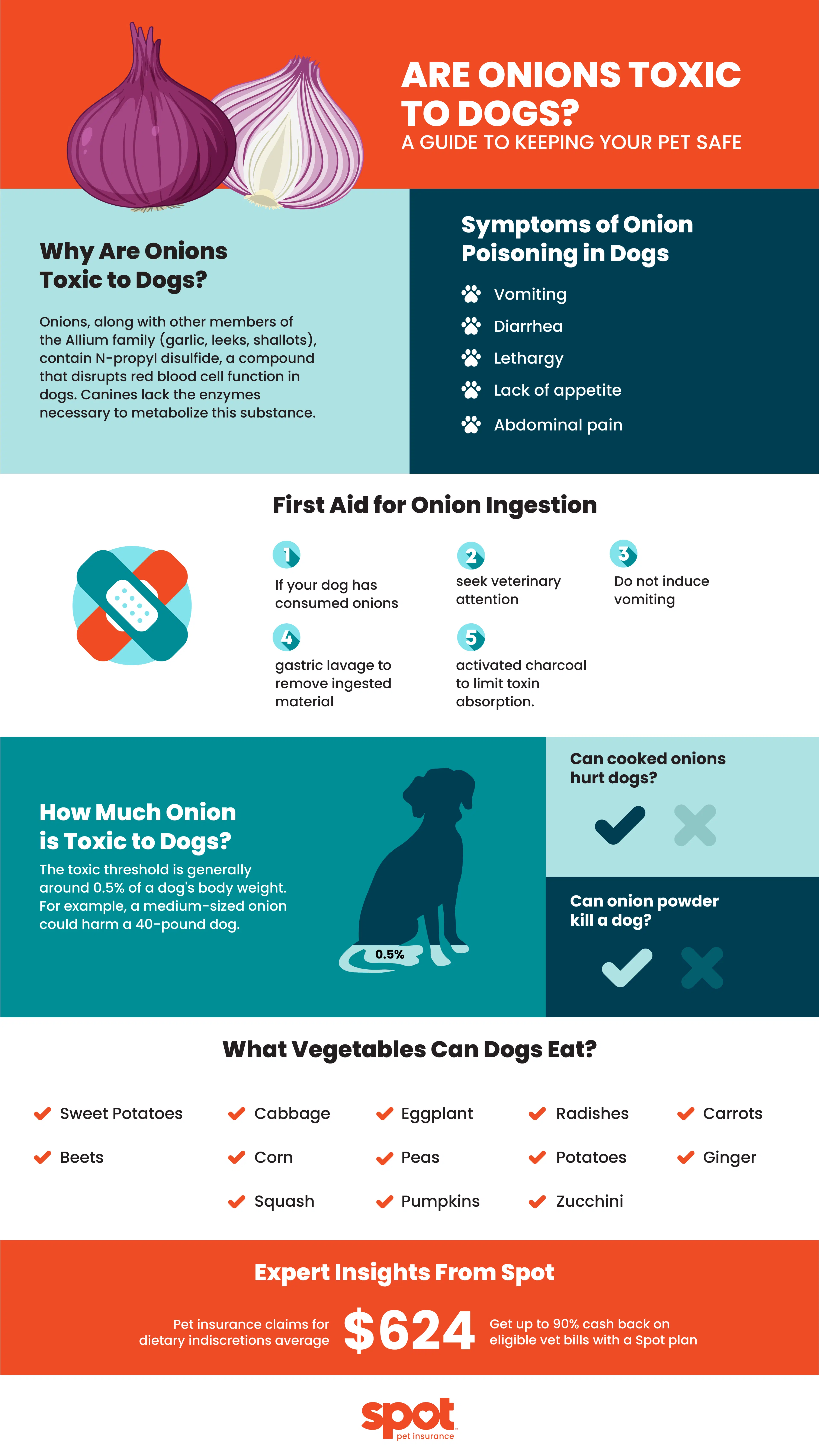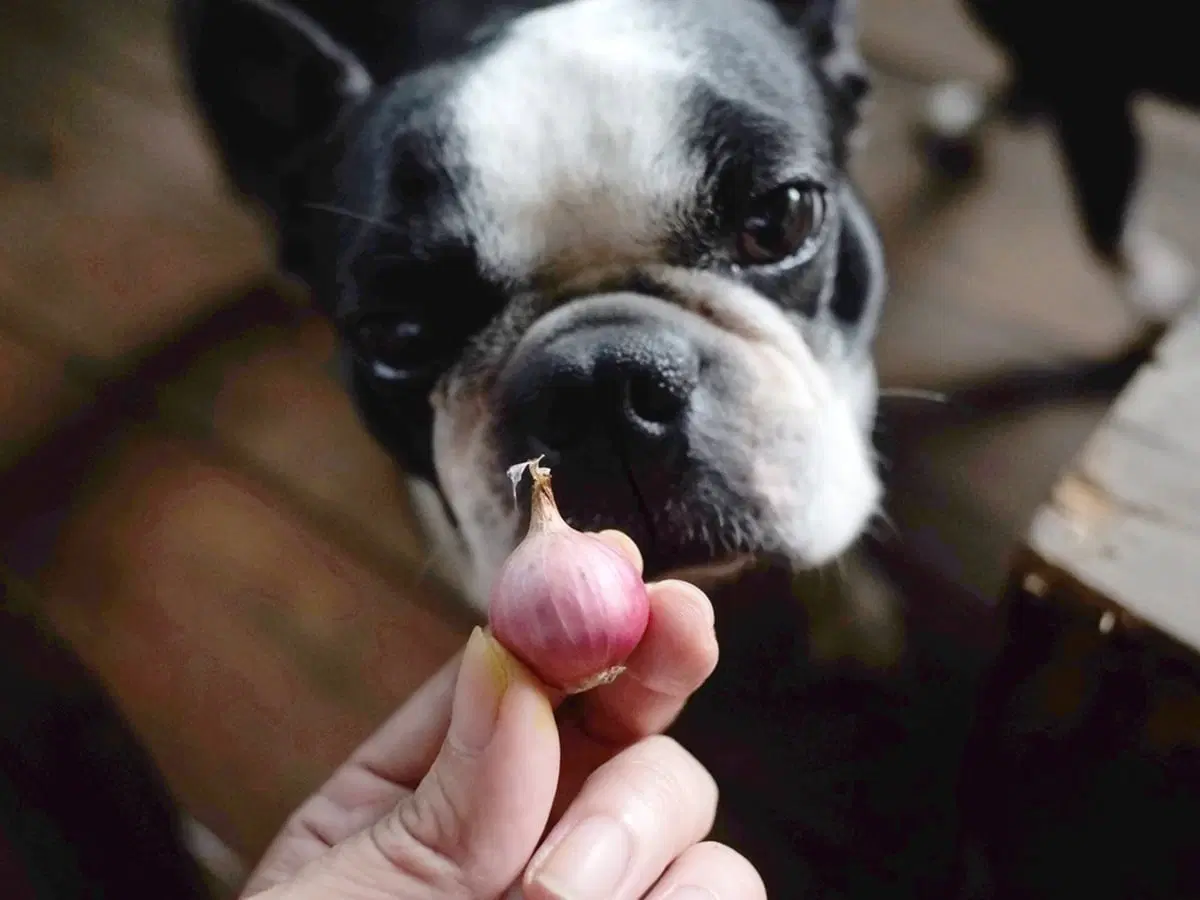Responsible pet ownership includes being mindful of potential dietary hazards. While onions are a common ingredient in human cuisine, it's crucial to understand the significant risk they pose to a dog's health. Can dogs eat onions? Continue reading below to learn more.
Why Are Onions Toxic to Dogs?
Onions, along with other members of the Allium family (garlic, leeks, shallots), contain N-propyl disulfide, a compound that disrupts red blood cell function in dogs. Canines lack the enzymes necessary to metabolize this substance1.
N-propyl disulfide can cause gastrointestinal distress and, if consumed in sufficient quantities, leads to hemolytic anemia. This condition involves the premature destruction of red blood cells, impairing oxygen transport throughout the body4.
How Much Onion is Toxic to Dogs?
The toxic threshold is generally around 0.5% of a dog's body weight. For example, a medium-sized onion could harm a 40-pound dog1. Certain breeds, including Japanese breeds like Shiba Inus and Akitas, may be more susceptible to onion toxicity2.
Symptoms of Onion Toxicity in Dogs
Initial signs of onion toxicity might include1:
Diarrhea
Lethargy
Lack of appetite
Signs of hemolytic anemia may include2:
Pale gums
Weakness
Elevated heart rate
Discolored urine (reddish or brown)
Collapse
What To Do If My Dog Has Eaten Onions
If you suspect your dog has consumed onions, seek immediate veterinary attention. Do not induce vomiting without consulting a veterinarian. Your veterinarian may recommend gastric lavage (stomach pumping) to remove ingested material and administer activated charcoal to limit toxin absorption.2
Frequently Asked Questions
Can cooked onions hurt dogs? Yes. Onions are toxic to dogs regardless of preparation (raw, cooked, powdered).
Can onion powder kill a dog? Yes. Onion powder is highly concentrated, making it even more dangerous than fresh onions.
What happens if a dog eats a little bit of onions? Even small amounts can irritate the stomach and, depending on dose and body weight, damage red blood cells (onion/Allium toxicosis), with signs that may appear immediately or be delayed for a few days.
What to do if dog ate small piece of onion? Contact your veterinarian or a poison hotline for guidance—don’t induce vomiting at home unless instructed; your vet may recommend decontamination and monitoring bloodwork over the next few days.
Is there a cure for onion poisoning in dogs? There’s no specific antidote; treatment is supportive (e.g., decontamination, IV fluids, oxygen, and in severe anemia, blood transfusions), and prognosis is generally good with prompt care.
How quickly can onion poisoning symptoms appear in dogs? GI upset can occur soon after ingestion, while blood-related signs (from hemolytic anemia) often appear a day to several days later— body changes can start within 24 hours, but clinical anemia may be delayed.

What Vegetables Can Dogs Eat?
Though our canine companions cannot enjoy every food we can, several veggies are safe for both dogs and humans. We have compiled a list for you of vegetables that dogs can eat! Included on this list are various veggies you might have on hand such as; sweet potatoes, cabbage, eggplant, radishes, carrots, beets, corn, peas, potatoes, ginger, squash, pumpkins, zucchini, and so many more! Each vegetable offers different nutritional values and benefits, so it’s a good idea to introduce different vegetables to your dog's diet.
Expert Insights From Spot
While it can be fun to share our favorite foods with our pets, pet parents should keep in mind that sometimes, eating human food can upset a pet's stomach. Spot's internal data shows that on average, pet insurance claims for dietary indiscretions (pets eating too much of what they shouldn't) cost $642.* This high cost highlights why pet parents should keep an eye on what their pets eat, and do their research before sharing their favorite snacks with their dogs. Being mindful of what treats we share with our pets can help keep them healthy while helping pet parents avoid unnecessary vet bills.
More About Spot Pet Insurance
Pet insurance can help provide financial assistance for covered veterinary care in case of unexpected accidents, illnesses, or injuries. Our plans can help pet parents manage the eligible costs of covered veterinary care and help ensure that their pets can receive the best treatment possible. Here are some ways that Spot pet insurance plans can help:
Helps Cover Unexpected Veterinary Costs: Spot pet insurance plans help cover the eligible costs of unexpected veterinary treatments, such as emergency surgeries, X-rays, and prescription medications for covered conditions.
Customizable Plans: Choose your annual limit, reimbursement rate, and deductible from a range of options, and create the plan that will fit the needs of your pet and your budget.
Peace of Mind: With Spot pet insurance plans, pet parents can know that they can provide the best care for their pet with less worry about the cost.
To learn more about Spot Plans or to get a free quote, click here.
Key Takeaways
Onion toxicity is a serious issue for dogs. Responsible pet owners should prevent access to onions in all forms. Prompt veterinary care is crucial if your dog ingests onions. By prioritizing dog-safe foods and treats, you can safeguard your furry companion's health and well-being.

I've had the privilege of immersing myself in the realm of pet safety. As the owner of an energetic mini golden doodle, I know just how stressful being a pet owner can be. I am dedicated to ensuring our beloved pets enjoy a life brimming with good health.
*Jan 2019 to Aug 2024 administrator claims data.
1. “Can Dogs Eat Onions? Everything You Need to Know.” American Kennel Club, 7 May 2024, www.akc.org/expert-advice/nutrition/can-dogs-eat-onions/
2. “Onion, Garlic, Chive, and Leek Toxicity in Dogs | VCA Canada Animal Hospitals.” VcaCanada, no date, vcacanada.com/know-your-pet/onion-garlic-chive-and-leek-toxicity-in-dogs
3. “Onion.” ASPCA, no date, www.aspca.org/pet-care/animal-poison-control/toxic-and-non-toxic-plants/onion.
4. “Anemia - Hemolytic Anemia | NHLBI, NIH.” Www.nhlbi.nih.gov, 24 Mar. 2022, www.nhlbi.nih.gov/health/anemia/hemolytic-anemia.
The information presented in this article is for educational and informational purposes only and does not constitute or substitute for the advice of your veterinarian.












